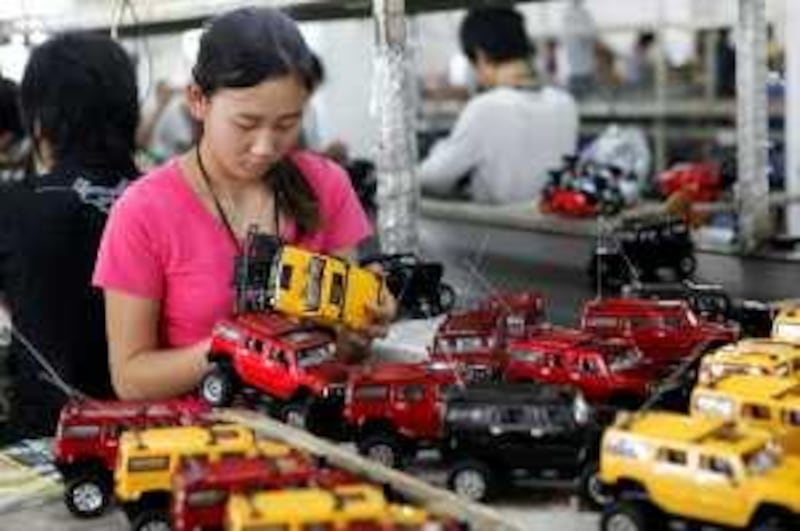The toy factories of southern China's industrial provinces cannot find sufficient numbers of workers to make the goods needed for the Christmas market, as the recovery in the Chinese economy translates into higher employment. News of a "worker drought" come just months after riots by laid-off workers outside those same factories, angry at losing their jobs as foreign orders dried up. The change of direction in the Chinese job market has been spectacular, and there are dissenting voices in China which doubt the true extent of the turnaround.
One stumbling block to China's toy industry has been its frosty relationship with India, one of the country's chief trading partners, which banned imports of several types of toys from China for six months early this year "in the public interest". The act was considered a sign of growing protectionism, as the impact of the financial downturn continues to be felt. On a grander scale, 22 million migrant workers lost their jobs late last year, as 20 million of China's 130 million rural migrant workers returned home because of the economic slowdown and the collapse of the export market.
The situation has improved after the government's 4 trillion yuan (Dh2.15tn) stimulus plan, measures to relieve the pressure on companies that formerly survived on exports, and massive lending by the country's state-owned banks. A report on human resources by the Zhejiang provincial government showed 603,000 vacancies but only 354,000 job seekers. Shenzhen reported a shortage of 23,000 workers in April this year, even though the unemployment situation there at the start of the year was severe, with the shortage rising to 60,000 vacancies in June.
A survey by the toy association of Guangdong province revealed that toy makers were showing a labour shortfall of between 10 and 30 per cent, with some companies down to just 50 per cent of the workers they needed. Zhang Xiulan, the chief of the School of Social Development and Public Policy at Beijing Normal University, told the China Daily newspaper: "The situation is getting better due to the package of governmental policies to stimulate the economy.
"Many factories in the coastal region have recovered and received more orders, particularly the export-oriented enterprises in Wenzhou and Shenzhen." The labour ministry hopes to keep the urban unemployment rate below 4.6 per cent this year, which, while better than many other countries around the world, would still be the highest since 1980. However, there are plenty of sceptical voices online about the upturn in the labour market.
"For as long as I can remember, our great country's unemployment rate is always 4 per cent," one web commentator, "Qing Shou", said, while "Micky Pig" wrote: "Our country's unemployment rate is based on the urban population! They don't pay attention to peasants, even though they are starved to death." Massive infrastructure projects as part of the government's stimulus spending have provided work in rural parts of the country, as well as the cities. Money from the stimulus plan is also helping to kick-start the property sector, which also boosts employment.
At the same time, China's state-controlled banks have been lending at a furious rate, pumping Dh645 billion in extra lending to Chinese consumers and businesses in the first seven months of this year. A record number of cars are being sold, industrial output is picking up and orders appear to be stabilising. This is crucial, as many of the job losses late last year and early this year were inspired by the collapse in order books, prompted by the reversal in overseas contracts.
Exports remain in the mire: government data shows that demand for Christmas products produced in Guangdong province from January to September have fallen by 46.3 per cent compared with the same period last year. What orders that are coming through are short-term orders, and it is difficult to get migrant labour to return from the countryside to take up casual work that may be only a short-term option.
To fight the downturn in exports, the government has given huge tax breaks to exporters and brought in other measures to curb the effect of lower trade, including keeping the value of the yuan low to keep Chinese goods competitive, and introducing various restrictions on imports. Even if China meets its economic growth target of 8 per cent this year, as is widely expected, this is unlikely to result in more jobs this year, and up to 12 million may not find work, said Yin Weimin, the minister of human resources and social security.
Mr Yin said China would be able to provide openings for about half of its 24 million job hunters, if it met the growth target for this year. A much hoped-for increase in the number of service-sector jobs has not materialised. Ministry statistics show 6.6 million people in urban areas found jobs between January and July, three quarters of the target of 9 million jobs during the period. Mr Yin told the People's Daily: "The shortfall between supply and demand [in employment] will become larger than last year due to the failure to create enough job opportunities."
Data from the National Bureau of Statistics shows that 151 million migrant workers, who mostly work in factories or on building sites, were employed outside their hometowns at the end of June, up 2.6 per cent from the first quarter figure. By the end of June, 4.2 million rural migrant workers were still unemployed outside their hometowns. One web commentator warned: "Chinese people value family relationships. If a husband or wife is jobless, he or she could stay at home and look after children. Or they could rely on parents for living. But when the balance is broken, the society will be very unstable."
business@thenational.ae





